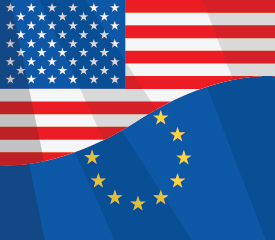ICOS meets EU/US TTIP Negotiating Teams on Agri Issues

On Wednesday, February 4th ICOS was again invited to meet the negotiating teams covering the Agricultural chapters of TTIP, during the 8th round of negotiations in Brussels.
Commission figures released this week show that overall August to November 2014 EU agriculture exports to the US were €5.96 billion, up 9% on last year, and double overall EU Agri exports to China.
Much of the discussions on the day, focused on the dairy elements of the agreement where we as an industry have offensive interests, especially in higher value exports.
Cheese exports to the US continue to increase, even in the absence of an overall agreement but we highlighted difficulties that we were experiencing currently in getting our product into the US market.
These difficulties are particularly in the area of Sanitary & Photosanitary Barriers, as well as other Non- Tariff Barriers to trade.
We discussed issues such as the US Grade A Pasteurised Milk Ordinance, and the restrictions that places on Irish and EU product in being accepted in the US. There also is a new Food Safety Modernization Act going through the Capitol Hill process, and we fear that instead of making exports & mutual recognition easier, that it will be used as an unfair barrier to dairy trade.
An interesting new angle discussed was the possibility of defining some Irish Dairy as organic, as our systems conform to many US definitions, but this is at very early stages.
Dairy Geographical Indicators, especially in cheese is a major stumbling block for the Americans and other EU countries, but is of little relevance to our ambitions in the deal at present.
It has to be pointed out though that at dairy commodity level, we are highly unlikely to be competitive with the American dairy industry, our opportunities are clearly up the value chain.
While our efforts in dairy have been primarily offensive in nature on behalf of our Dairy co-operatives, we are also deeply cognisant of the possible defensive interests that our beef sector has.
We are looking at this closely through the lens of our co-operative based Mart and breeding interests, and also from the dairy beef interests of our members. While it is clear that the US are looking for a major increase in beef quota access to the EU, it is a red line that any increase will have to be on the level of our food safety standards.
There has also been a major increase of recognition of hormone free, grass fed beef. This is evidenced in the recent $4 million Super bowl ad campaign and the fact that prices for this type of beef are high. To illustrate this, in an intervention by the US beef export federation, they stated that EU beef prices have now been significantly surpassed by US prices in this area in the domestic US market.
In a briefing session with the chief negotiators in the afternoon they said that they are hoping that the next 9th round of negotiations will have a published ‘exchange of officers’ between the two sides.
The sentiment in Brussels though is that there will be no significant move on TTIP until the Americans conclude the TPP with Pacific based countries, and that is pencilled in for conclusion in the summer, leaving a very small window of opportunity for a TTIP deal before the American political cycle swings to presidential election mode.